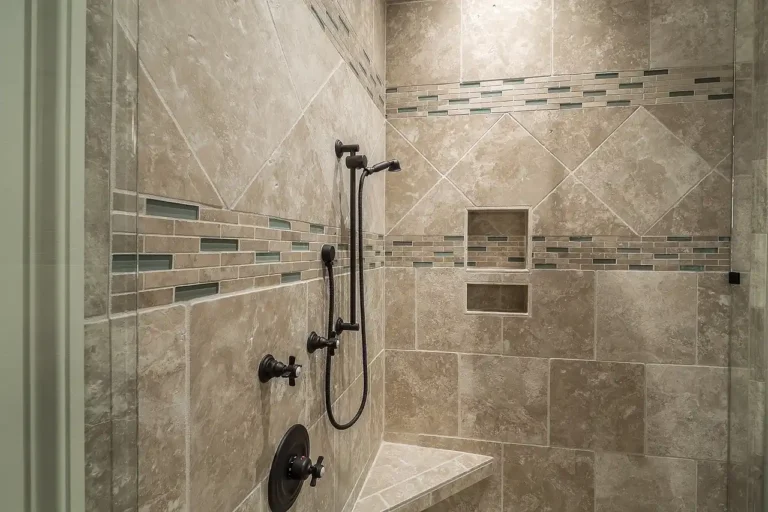When it comes to renovating your bathroom, the design possibilities can feel endless. One of the most common questions I hear from homeowners is, “Can you use floor tile on a shower wall?” It’s a great question because it’s not just about aesthetics; it’s also about durability, water resistance, and long-term functionality.
As someone who’s worked with countless materials, I understand the importance of choosing the right tiles for the right surface. Whether you’re updating your shower or building a new one, it’s crucial to make informed decisions. Today, I’m going to walk you through everything you need to know about using floor tiles on shower walls, including the benefits, potential issues, and things to keep in mind during installation.

Let’s dive in.
Can You Use Floor Tile on a Shower Wall?
At first glance, it might seem like using floor tile on shower walls is a great idea. After all, both are tiles, right? However, the answer is more nuanced. Yes, you can use floor tile on a shower wall, but there are several important factors to consider before making your decision.
What Makes Shower Walls Different from Floors?
To understand whether floor tiles can work on shower walls, you need to first understand the differences between floors and walls when it comes to tiling.
- Weight and Support: Floor tiles are typically designed to handle a higher weight load. They are heavier and thicker than wall tiles, which means they can be more difficult to install and may not adhere well if the wall structure isn’t properly prepared.
- Water Resistance: Shower walls are exposed to constant moisture, so tiles in these areas need to have superior water resistance. While floor tiles generally have a strong glaze, they are not always optimized for constant water exposure.
- Tile Orientation: Floor tiles are made to withstand foot traffic, so they often have textured surfaces for added grip. On the other hand, wall tiles are generally smoother, as they don’t need to resist the same level of physical stress.
- Size and Style: Floor tiles tend to be larger, and they come in a variety of shapes, from squares to rectangles. Shower walls, however, typically use smaller tiles to allow for easier installation around corners, curves, and fixtures.
The Pros of Using Floor Tile on a Shower Wall
There are some advantages to using floor tile on shower walls, but these depend on the specific tile you choose.
1. Durability
Floor tiles are generally thicker and more robust than wall tiles. If you’re looking for a tile that can stand up to the rigors of a shower environment, a floor tile can offer extra strength and longevity.
2. Aesthetic Continuity
Using floor tile on a shower wall creates a seamless look, especially if you’re trying to match your bathroom floor tiles to the wall. This can help create a cohesive design throughout the room.
3. Variety of Options
Many floor tiles are available in different finishes, colors, and textures, which means you have a wide range of options to choose from when designing your shower. You can use larger tiles, mosaic patterns, or even textured tiles that would be difficult to use on floors.
The Cons of Using Floor Tile on a Shower Wall
While it may sound like a good idea, there are a few disadvantages to using floor tiles on shower walls that you need to keep in mind.
1. Weight
As mentioned earlier, floor tiles are often thicker and heavier than wall tiles, which can make installation more challenging. This additional weight might require you to strengthen your wall’s structure or use specific adhesive products.
2. Moisture Absorption
Some floor tiles, especially natural stone options, can be more porous, making them prone to moisture absorption. This can be problematic in a high-moisture environment like a shower, where constant water exposure can lead to mildew or mold growth.
3. Difficult Installation
Larger floor tiles, especially those with uneven edges, can be tricky to install on shower walls. If you’re not experienced with tiling, it may take extra time and effort to get the job done correctly. Also, wall tiles are usually smaller, making them easier to cut and fit around shower fixtures.
Types of Floor Tiles You Can Use on Shower Walls
If you’re considering using floor tiles on shower walls, it’s important to select the right type. Not all floor tiles are created equal, and some are better suited for wet environments than others.
Porcelain Tiles
Porcelain tiles are an excellent option for both floors and walls due to their dense, non-porous nature. They’re resistant to water absorption and come in a variety of designs. You can use porcelain floor tiles on shower walls without worrying about moisture damage.
Ceramic Tiles
Ceramic tiles are a popular choice for both floors and walls. While they are durable and water-resistant, they’re generally not as dense as porcelain. You’ll want to choose high-quality ceramic tiles that are rated for wet environments to avoid water absorption.
Learn How to Clean Black Bathroom Fixtures?
Natural Stone Tiles
Natural stone, such as slate or marble, is another attractive option. However, because stone tiles are porous, you’ll need to seal them regularly to prevent water absorption. Using natural stone floor tiles on shower walls can create a luxurious, rustic look, but maintenance is key.
Glass Tiles
Glass tiles are often used for shower walls due to their sleek, reflective quality. While glass tiles are generally not used for floors due to their fragility, they can work well on shower walls when properly installed and sealed.
Mosaic Tiles
Mosaic tiles are a popular choice for both floors and walls, thanks to their versatility and ability to fit around curves and corners. Whether you use them for the entire shower wall or as accents, mosaic floor tiles can create a unique and stylish design.
Installation Tips for Using Floor Tile on Shower Walls
Installing floor tile on a shower wall can be done successfully with the right approach. Here are a few installation tips to ensure your project is a success:
Use the Right Adhesive
Due to the weight and thickness of floor tiles, you’ll need a strong adhesive that can support their weight. Look for adhesives specifically designed for wall use, such as thin-set mortar, which will help ensure the tiles stay securely attached to the wall.





